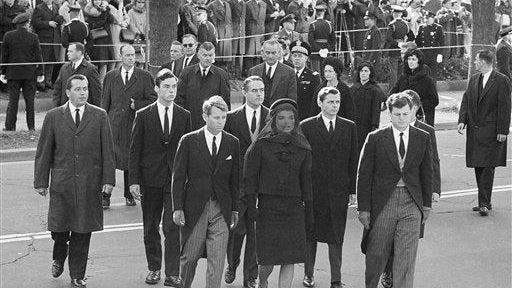Conspiracy theories are a threat to democracy

When I was little, I was a conspiracy theorist.
The shocking assassination of President John F. Kennedy, and the devastated responses of the adults in my small universe, were profound and searing.
It was a traumatic introduction to the wider world.
The circumstances surrounding JFK’s death spawned a cottage industry that’s still going strong. A 2017 survey conducted by FiveThirtyEight found that 61 percent of Americans still don’t believe accused assassin Lee Harvey Oswald acted alone.
No one wants to believe history can turn on a moment generated by a single, disaffected, lucky-shot twerp like Oswald, or John Wilkes Booth, James Earl Ray, or Gavrilo Princip.
When I was a kid, there were fish-wrap tabloids claiming that JFK wasn’t really dead, that he actually was a wheelchair-bound vegetable being cared for on one of Aristotle Onassis’ private islands.
I wanted to believe it because the alternative was too hard to accept. Even now, when I see photos of the Kennedys in Dallas, I wish I could reach through time and tell them to get back on the plane.
There were rumors that Vice President Lyndon B. Johnson was behind the crime, and if not Johnson, then Fidel Castro, or maybe the mob, or the FBI/CIA/military-industrial complex.
It’s a virtual cast of thousands — all of whom managed to keep it a secret?
No matter. I gobbled it all down like Boston baked beans.
But at some point, you have to put away childish things. John F. Kennedy was dead, and no amount of wishing or theorizing was going to bring him back.
For some people, the result of the recent election has become the stuff of conspiracy. Those arguing that the results are bogus and rigged cannot fathom that more people voted for incumbent President Donald Trump’s opponent than for him.
They’re ignoring that most down-ballot Republicans won their races. They’re dismissing the math which shows that more eligible voters cast ballots this time than in 2016, including in Ohio, where 74 percent of eligible voters, cast a ballot. It’s as if the lines of people waiting sometimes for hours to cast their votes never happened, or that the Election Assistance Commission, Republican governors and state attorneys general, and former Department of Homeland Security cybersecurity chief Christopher Krebs haven’t publicly stated that the Nov. 3 election was the safest ever.
Some supporters have rejected the results of the recounts — and the recounts of the recounts — despite the dozens of times the federal courts have swatted down contentions that something is amiss. It denigrates the poll workers and boards of election staffers who risked their health to ensure we could exercise our constitutional right to have a say in our government.
Last week, the U.S. Court of Appeals for the 3rd Circuit unanimously rejected accusations of “deep state” chicanery, with Trump-appointed Judge Stephanos Bibas writing: “Free, fair elections are the lifeblood of our democracy. Charges of unfairness are serious. But calling an election unfair does not make it so. Charges require specific allegations and then proof. We have neither here.”
We have a transactional president who can’t seem to grasp how a judge might place more priority on following the law and precedent than reciprocation for his or her appointment. This presents a serious threat previously seen only in banana republics. We’ve been so worried about the Russians; now we know the call is coming from inside the house.
Latching onto conspiracy theories because things didn’t turn out the way you wanted is a rabbit hole that can corkscrew to the point where it’ll turn out that Barack Obama fixed the 1919 World Series, and Hunter Biden killed Biggie and Tupac.
History reminds us that many elections have been contested, including Kennedy’s own, in which he won the popular vote by just 112,827 votes, but capturing the Electoral College 303 to 219. Rumors persist that Kennedy was helped by the Democratic machine in Chicago, where the dead were said to vote early and often.
Yet his opponent, Richard Nixon, did not weaponize the courts to get his way.
That would come later.
Sowing chaos and doubt when things don’t go our way only serves to harm the nation’s ability to move forward — as it must.
*** This article has been archived for your research. The original version from Canton Repository can be found here ***


